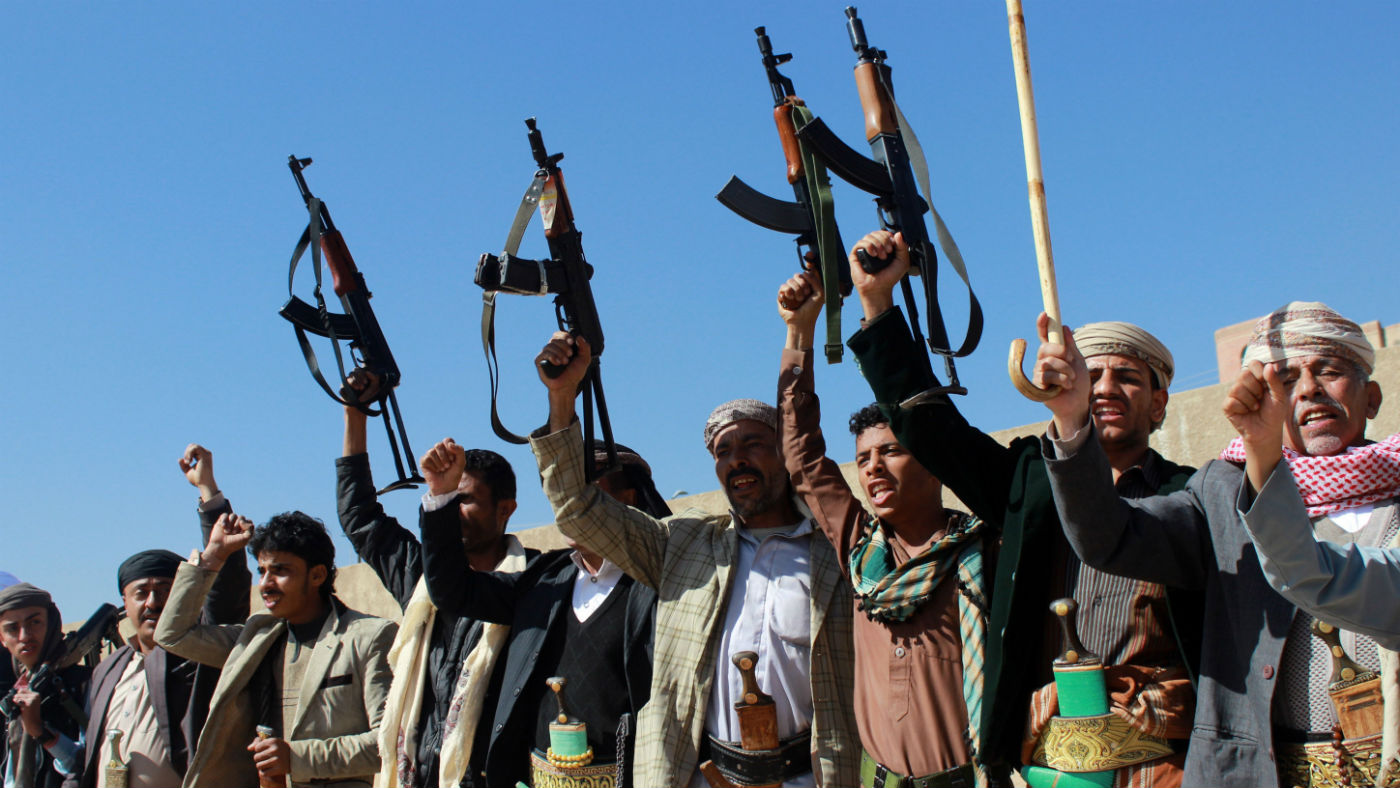Saudis threaten all-out war with Iran
After years of proxy conflicts, are the Middle East's two great powers ready for war?

A free daily email with the biggest news stories of the day – and the best features from TheWeek.com
You are now subscribed
Your newsletter sign-up was successful
The proxy conflict in Yemen between the Middle East’s two great powers could become all-out war, after Saudi Arabia accused Iran of being behind a missile strike on Riyadh airport on Saturday.
In comments reported by the Saudi Arabian official news agency SPA, Crown Prince Mohammed bin Salman told the Foreign Secretary, Boris Johnson, that supplying Houthi rebel fighters in Yemen with missiles used in the attack was a “direct military aggression by the Iranian regime” and “may be considered an act of war against the Kingdom”.
Made after a wave of arrests that appear to consolidate his hold on power, the Crown Prince’s remarks “signal a new aggressiveness both at home and abroad, as well as a new and more dangerous stage in the Saudi cold war with Iran for dominance of the region”, says The New York Times.
The Week
Escape your echo chamber. Get the facts behind the news, plus analysis from multiple perspectives.

Sign up for The Week's Free Newsletters
From our morning news briefing to a weekly Good News Newsletter, get the best of The Week delivered directly to your inbox.
From our morning news briefing to a weekly Good News Newsletter, get the best of The Week delivered directly to your inbox.
CNN says this is the latest attempt by the Saudi government to accuse Iran of “not only being behind the actions taken in Yemen, but also for its purported behaviour in Lebanon”. It must been seen in “the context of a regional power play by the Saudis against Iran”, says Al Jazeera.
Lebanese leader resigns
Iran has repeatedly been accused of sponsoring Lebanese Shiite militant group Hezbollah, which forms a central part of a pro-Syrian alliance in Lebanon’s parliament. On Saturday, Saudi-backed Sunni politician Saad Hariri resigned as Lebanon’s prime minister blaming Iran and Hezbollah for meddling in the “internal affairs of Arab countries”.
Speaking to Al Arabiya, the Saudi-backed broadcaster, Saudi minister for Gulf affairs Thamer al-Sabhan said the weekend’s developments meant that for Saudis there would now be “no more distinction between Hezbollah and the Lebanese government,” and from now on the kingdom would treat the Lebanese as “a government declaring war”.
A free daily email with the biggest news stories of the day – and the best features from TheWeek.com
Already bogged down in proxy wars against Iran’s allies in Yemen and Syria, Saudi Arabia seems determined to engage Hezebollah in Lebanon, where it is well entrenched.
But tinkering with that country’s fragile stability “has huge risks”, says the BBC, “not least the danger of prompting a crisis that could lead to a full-scale war between Israel and Hezbollah”.
“It is plausible that the Saudis are trying to create the context for a different means of contesting Iran in Lebanon: an Israeli-Hezbollah war,” suggests Israeli newspaper Haaretz.
While the preferred method of conflict between Saudi Arabia and Iran has long been proxy wars, Foreign Policy magazine predicts it is only a matter of time before fighting will “eventually spill over in a short, sharp direct clash, and then sink back down again to the level of proxy wars in other people’s territories”.
-
 What to know before filing your own taxes for the first time
What to know before filing your own taxes for the first timethe explainer Tackle this financial milestone with confidence
-
 The biggest box office flops of the 21st century
The biggest box office flops of the 21st centuryin depth Unnecessary remakes and turgid, expensive CGI-fests highlight this list of these most notorious box-office losers
-
 What are the best investments for beginners?
What are the best investments for beginners?The Explainer Stocks and ETFs and bonds, oh my
-
 Epstein files topple law CEO, roil UK government
Epstein files topple law CEO, roil UK governmentSpeed Read Peter Mandelson, Britain’s former ambassador to the US, is caught up in the scandal
-
 Iran and US prepare to meet after skirmishes
Iran and US prepare to meet after skirmishesSpeed Read The incident comes amid heightened tensions in the Middle East
-
 Which way will Trump go on Iran?
Which way will Trump go on Iran?Today’s Big Question Diplomatic talks set to be held in Turkey on Friday, but failure to reach an agreement could have ‘terrible’ global ramifications
-
 Israel retrieves final hostage’s body from Gaza
Israel retrieves final hostage’s body from GazaSpeed Read The 24-year-old police officer was killed during the initial Hamas attack
-
 China’s Xi targets top general in growing purge
China’s Xi targets top general in growing purgeSpeed Read Zhang Youxia is being investigated over ‘grave violations’ of the law
-
 Panama and Canada are negotiating over a crucial copper mine
Panama and Canada are negotiating over a crucial copper mineIn the Spotlight Panama is set to make a final decision on the mine this summer
-
 Iran unleashes carnage on its own people
Iran unleashes carnage on its own peopleFeature Demonstrations began in late December as an economic protest
-
 How oil tankers have been weaponised
How oil tankers have been weaponisedThe Explainer The seizure of a Russian tanker in the Atlantic last week has drawn attention to the country’s clandestine shipping network